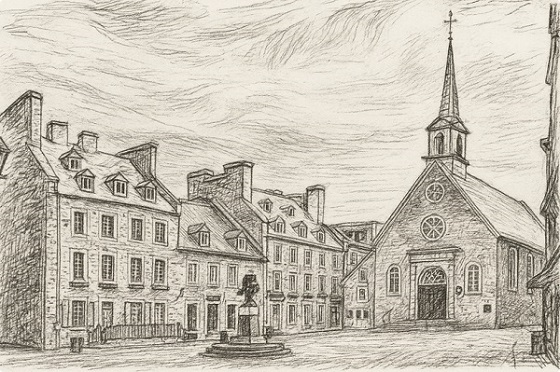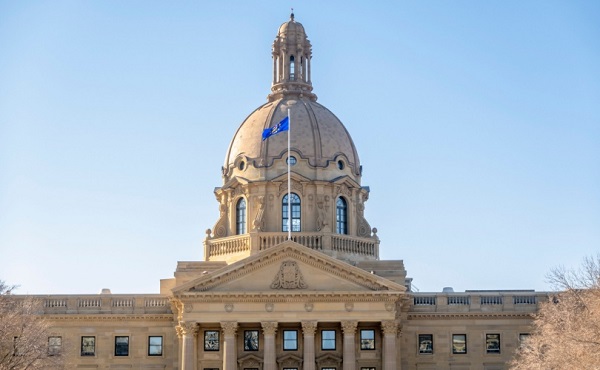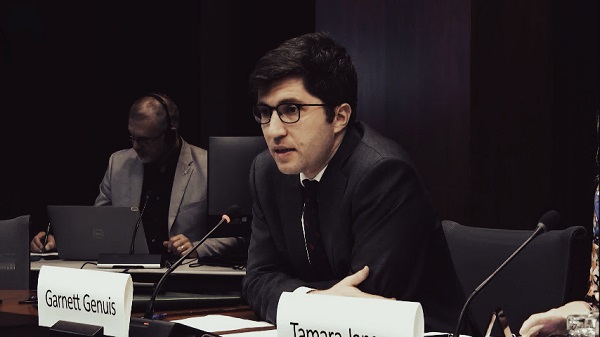Censorship Industrial Complex
Canada caves when free speech is under fire

This article supplied by Troy Media.
 By Collin May
By Collin May
When I came under fire, no one in Canada had my back. It was U.S. groups that stepped up. That says a lot about the state of our institutions
It’s been a busy few weeks in Anglosphere politics. Canada and Australia both held federal elections, while in England, voters went to the polls for local
races and a high-stakes parliamentary byelection.
The campaigns—and their results—couldn’t have been more different. In Canada and Australia, incumbent left-leaning governments shaped their
campaigns around external threats, particularly U.S. President Donald Trump’s trade tariffs. They portrayed these as “existential threats” to national
sovereignty, crowding out debate on urgent domestic issues like housing, affordability and migration.
But English voters weren’t interested in fear campaigns. Instead, they used the opportunity to send a clear message of frustration with their own political class, punishing both the stumbling Labour government and the disoriented Conservatives.
Across local councils and mayoral races, the upstart Reform Party, a populist, centre-right movement, swept aside the traditional parties. Reform captured more than 30 per cent of the vote, winning 677 council seats and control of 10 of the 23 contested councils. The Conservatives collapsed, losing 674 seats, Labour dropped 187, and the Lib Dems gained 163. In the first parliamentary byelection since the 2024 national vote, a supposedly safe Labour seat—Runcorn and Helsby—flipped to Reform by just six votes.
These results reveal more than political turbulence. They expose important differences in political culture. British voters, with their long democratic tradition and broader economy, proved more resistant to fear-driven narratives centred on U.S. politics. Canada and Australia, more economically dependent and less institutionally resilient, were more vulnerable to manipulation by politicians exploiting insecurity and simplistic caricatures of American threats.
The cost of this vulnerability is domestic neglect. In Canada, conversations about civil liberties, housing, immigration and cost-of-living pressures, especially on younger Canadians, were largely sidelined.
This failure isn’t abstract. I experienced it firsthand.
In 2022, I was appointed chief of the Alberta Human Rights Commission. Soon after, a small but vocal activist group targeted me with allegations of Islamophobia and racism, based on a misrepresentation of a 2009 academic article I wrote on political theology. Canadian institutions that should have stood for due process and free expression remained silent.
Support only arrived once the story caught the attention of American organizations. Groups like the Middle East Forum, the Clarity Coalition, the
National Association of Scholars and Law & Liberty offered platforms for me to speak, publish and respond. Only then did some Canadian outlets take notice.
At the heart of this silence was a deeper issue: Canada lacked the civic infrastructure to defend free speech, academic freedom and open debate,
especially when they challenge prevailing orthodoxies.
That, thankfully, may be starting to change.
Since my dismissal, several new organizations have emerged. The Clarity Coalition, an alliance of Muslims, ex-Muslims and allies committed to liberal
democracy, launched a Canadian chapter, which I now co-chair with Yasmine Mohammed. In 2024, it joined others to form the Alliance of Canadians
Combating Antisemitism. And earlier this year, lawyer Lisa Bildy, who represented the late Richard Bilkszto, a Toronto principal targeted in a
cancellation campaign, founded a Canadian chapter of the Free Speech Union.
These developments mark a long-overdue pushback. For the first time in years, Canadian groups are coalescing around foundational values and offering critical support to individuals willing to challenge entrenched activist networks. Still, the fight is uphill. These organizations are new, their resources are limited and the pressure is intense.
In my own case, my legal counsel has led a defamation suit against several of the groups that destroyed my reputation and cost me my position. Legal action is costly, and so far, the only significant financial support I’ve received has come from the Lawfare Project, a New York-based legal defence group founded by a Canadian.
That in itself says a great deal.
There are signs of momentum. Muslims Facing Tomorrow, a Canadian group led by the courageous Raheel Raza, recently issued a public statement supporting my legal action and called on Alberta Justice Minister Mickey Amery to reinstate me as chief of the Alberta Human Rights Commission.
If that happens, my first act would be to establish an advisory council on free speech and academic freedom, because no society can remain democratic if it doesn’t defend its core values.
Whether Alberta’s government will act remains to be seen. But one thing is certain: if Canada wants to protect its democratic soul, it must stop relying on
others for courage and start standing up for its principles at home.
Collin May is a Senior Fellow with the Frontier Centre for Public Policy, a lawyer, and Adjunct Lecturer in Community Health Sciences at the University of Calgary, with degrees in law (Dalhousie University), a Masters in Theological Studies (Harvard) and a Diplome d’etudes approfondies (Ecole des hautes etudes, Paris).
Troy Media empowers Canadian community news outlets by providing independent, insightful analysis and commentary. Our mission is to support local media in helping Canadians stay informed and engaged by delivering reliable content that strengthens community connections and deepens understanding across the country.
Censorship Industrial Complex
Canada’s justice minister confirms ‘hate crimes’ bill applies to online content

From LifeSiteNews
Individuals could be criminally charged for social media posts or other online content deemed offensive by the government under the Combating Hate Act.
Canadian Justice Minister Sean Fraser admitted that his new “hate crime” bill would indeed allow a person to be criminally charged for social media posts deemed offensive by the government.
Recently asked about Bill C-9, the Combating Hate Act, Fraser said the bill would indeed apply to certain online content that involves the “willful promotion of hatred.”
“Generally speaking, the law will apply equally online as it does in real communities,” he said, adding, “just in the limited circumstances where there is the willful promotion of hatred against someone.”
As reported by LifeSiteNews, Bill C-9 has been blasted by constitutional experts as allowing empowered police and the government to go after those it deems have violated a person’s “feelings” in a “hateful” way.
Bill C-9 was brought forth in the House of Commons on September 19 by Fraser. The Liberals have boasted that the bill will make it a crime for people to block the entrance to, or intimidate people from attending, a church or other place of worship, a school, or a community center. The bill would also make it a crime to promote so-called hate symbols and would, in effect, ban the display of certain symbols such as the Nazi flag.
While being questioned by Conservative MP Andrew Lawton about Bill C-9, Fraser was asked if the new law would “affect what people can say and write on the internet” and also if people could be retroactively punished for online comments made today.
In reply, Fraser said, “The only circumstance where you could imagine some online comment attracting scrutiny under this law would attach to behaviour that is criminal today but would be punished less severely.”
He said that “(t)he willful promotion of hate is a crime today, but we want to recognize a distinct charge where that same behaviour uses certain symbols of hate to bring a higher degree of culpability.”
John Carpay of the Justice Centre for Constitutional Freedoms (JCCF) has blasted Bill C-9 as something that would “empower police” and the government to go after those it deems have violated a person’s “feelings” in a “hateful” way.
Also, as reported by LifeSiteNews, Conservative MP Leslyn Lewis called out the hypocrisy of Bill C-9 for being silent regarding rising “Christian hate.”
Lewis has warned before that Bill C-9 will open the door for authorities to prosecute Canadians’ speech deemed “hateful possibly.”
Carpay also lamented how the bill mentions “rising antisemitism” but says nothing about the arson attacks on Catholic and Christian churches plaguing Canada.
“Anti-Catholic hate is obviously not on the minister’s radar. If it were, he would have mentioned it when introducing the Combating Hate Act,” Carpay wrote.
Since taking power in 2015, the Liberal government has introduced numerous new bills that, in effect, censor internet content and restrict people’s ability to express their views.
Censorship Industrial Complex
Who tries to silence free speech? Apparently who ever is in power.

Now that Trump is running Washington, Conservative thinkers must ponder a new-found appreciation for silencing speech they don’t like.
From StosselTV
War on Words: Both Parties Try to Silence Speech They Don’t Like
Donald Trump, before he was reelected, said he’d end government censorship. But now that he’s in office? He calls speech he doesn’t like “illegal.”
Free Speech should be a bedrock American value, no matter who’s in office. After the murder of Charlie Kirk, Republicans, who once complained about censorship, became censors. Democrats suddenly flip-flopped. All politicians should remember, the way to fight speech you don’t like, is with more speech, not censorship.
After 40+ years of reporting, I now understand the importance of limited government and personal freedom.
——————————————
Libertarian journalist John Stossel created Stossel TV to explain liberty and free markets to young people.
Prior to Stossel TV he hosted a show on Fox Business and co-anchored ABC’s primetime newsmagazine show, 20/20.
Stossel’s economic programs have been adapted into teaching kits by a non-profit organization, “Stossel in the Classroom.” High school teachers in American public schools now use the videos to help educate their students on economics and economic freedom. They are seen by more than 12 million students every year.
———
To make sure you receive the weekly video from Stossel TV, sign up here: https://www.johnstossel.com/#subscrib…
———
-

 Business1 day ago
Business1 day agoCarney government risks fiscal crisis of its own making
-

 Alberta1 day ago
Alberta1 day agoB.C. would benefit from new pipeline but bad policy stands in the way
-

 Frontier Centre for Public Policy1 day ago
Frontier Centre for Public Policy1 day agoChurches Are All That Stands Between Canada And Tyranny
-

 Business11 hours ago
Business11 hours agoTrans Mountain executive says it’s time to fix the system, expand access, and think like a nation builder
-

 Alberta1 day ago
Alberta1 day agoAlberta introduces bill allowing province to reject international agreements
-

 Energy11 hours ago
Energy11 hours agoCAPP calls on federal government to reset energy policy before it’s too late
-

 Business2 days ago
Business2 days agoTrump Admin Establishing Council To Make Buildings Beautiful Again
-

 International2 days ago
International2 days agoUS Deploys Gerald Ford Carrier Strike Group To Target Cartels




